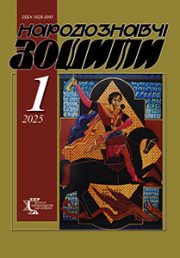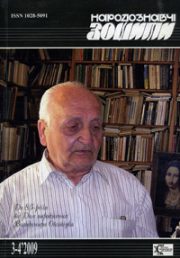The Ethnology Notebooks. 2018, № 4 (142), 1009–1015
UDK [378.016.80]:33
DOI https://doi.org/10.15407/nz2018.04.1009
Received 25.02.2018
Yakubovska Maria Stepanivna — Candidate of Philology, associate professor of Ukrainian Academy of Printing,
Pidholosko Street 19, 79020, Lviv, Ukraine.
Contacts: Tel. (097)921–2904; e-mail: kudid.uad@gmail.com
Abstrakt. An example of an analysis of the archetype of the novel by Galyna Tarasiuk explores the paradigm of the interaction of the human person and the archetype of modern culture as the basis of the creation of the cultural paradigm of modernity. On concrete examples, it turns out that literature is the most effective way of forming the self–consciousness of human individuality, and hence an important factor in the creation of the cultural paradigm of modern times. Therefore, the appearance in the information space Galyna Tarasiuk`s book has a great state–building significance, because on the example of the most prominent figures of our history, Taras Hryhorovych Shevchenko and Mariia Oleksandrivna Vilinska, on the example of their spiritual relationships and creative coopera–tion, a vibrant dialogue unfolds in a dissolute manner along the range.
Keywords: archetype of modern culture, culturological paradigm, cultural–world outlook, democratization of educa–tion, innovative programs, harmonious development of personality.
REFERENCES
Professyonal’noe obrazovanye: Slovar’: Uchebnoe posobye. (2000). Moskva: Vysshaia shkola [in Russian].
Tarasiuk, H. 2016. «Zore moia vechirniaia». Kyiv: Dnipro [in Ukrainian].
Ukrainskaia i zarubezhnaia kul’tura: Uchebnoe posobye. Kyev: Znannia [in Russian].
Khajek, F.A. (1992). Pahubnaia samonadeiannost’: oshybky sotsyalyzma (p. 22). Moskva: Novosty [in Russian].






